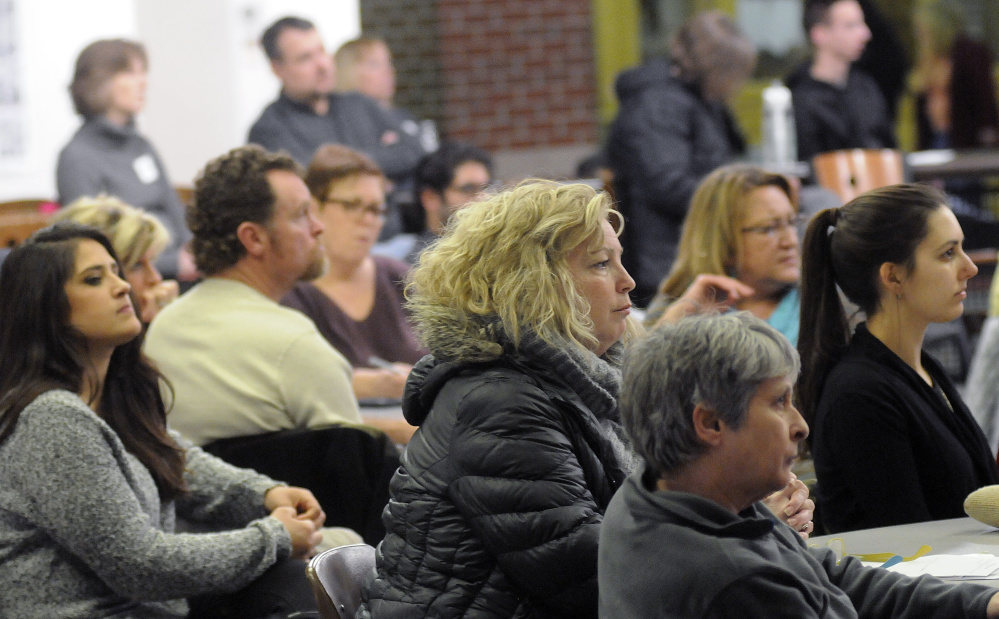AUGUSTA — The opiate abuse crisis visible here on city and rural streets, in police reports, and in hospital emergency rooms won’t go away until the community takes action to stop it, organizers of an upcoming forum say.
That’s why the goal of Wednesday’s opiates forum is not to present information about the problem to a crowd of people who’ll listen politely, then go home and forget about it. Rather, it is meant to prompt them into action.
“This is an action, not come and sit and listen. This is about what can you bring to the table to help with this,” Holly Kiidli, substance abuse coordinator for Healthy Communities of the Capital Area, one of several local organizations working to put together the forum. “We heard, at the first forum, people are ready to take action. They already know there is a problem, and they are looking to what they can do.”
The Take Back Our Community, Action in Augusta gathering is a follow-up to a Jan. 11 opiates forum attended by more than 275 people.
Kiidli said everyone, from clinicians to city officials to someone who has lost a loved one to a drug overdose, has some form of expertise or ability to help.
“Everybody has expertise in some area, everybody,” Kiidli said. “It may be someone who experienced losing someone to overdose, it may be someone who can speak about treatment, it may be someone who is raising their kids and knows exactly what her 10-year-old needs. Things are not going to change until our community really pulls together.”
Jared Mills, deputy police chief, said the biggest way people can help with the enforcement aspect of the fight against the spreading abuse of heroin, prescription drugs and other opiates is to report drug activity to police.
“Be our eyes,” Mills said of what the public can do to help. “We’ll show you how to get hold of us, which you can do anonymously, if you see something suspicious, and how to speak to a drug detective directly. We want to empower the public to give us that information, because we want to act on it.”
Mills said two detectives hired by Augusta Police to focus on drug-related crimes are now working regularly. One of them, Detective Nathan Walker, was the lead investigator in a bust last week on Mount Vernon Avenue prompted by information about suspected drug activity provided by the public, in which three were arrested and charged with trafficking cocaine and heroin.
Mills said having drug detectives, combined with a new, faster approach to such investigations, means police can take action much sooner than before.
“When we get drug (information) from the community like we did (in the Mount Vernon Avenue case), we’re acting on it as quickly as we can,” Mills said. “Before, these things would take months to put together. Instead of months, now it’s days.”
Statewide, drug overdose deaths increased by 31 percent in 2015, reaching a new high of 272 fatalities that was fueled by a near doubling of heroin deaths, according to data released earlier this month by the Attorney General’s Office. There were 107 deaths from heroin, compared to 57 heroin overdoses the previous year.
In Augusta alone, the Augusta Fire Department responded to 50 heroin overdoses in 2015, up from 26 in 2014 and just six in 2007, according to Fire Chief Roger Audette. The Augusta department used Narcan, a drug which can revive heroin users who have overdosed, 44 times in 2015 to revive people who weren’t breathing.
Wednesday’s forum begins at 6 p.m. in the auditorium at Cony High School in Augusta.
The format for this one will be a bit different than the first. Following opening remarks from Fred White, a psychologist and organizer, participants will break into any of six different community action teams, each focusing on a different aspect of the problem. Sessions for the community action teams will last about 30 minutes, then participants will have an additional half-hour session during which they can stay in the same group or take part in a group focusing on a different aspect. Then everyone will reconvene as a group to report on what took place in the smaller groups and plan what actions should be taken.
The smaller groups will focus on these six areas:
• Advocacy, including how to contact legislators and other officials to express concern and seek action;
• Treatment, including information on what services are available and how to navigate the treatment system;
• Medical, including a discussion of MaineGeneral policies and practices about treating pain, and how to identify signs and symptoms of narcotic use, abuse and overdose;
• Education and prevention, including information for parents on how to talk to their kids, and work on public service announcements;
• Recovery, including identifying gaps in recovery supports and taking action to reduce those gaps;
• Enforcement, including an update on current efforts being made to address the opiate crisis and how people can help local law enforcement agencies.
Keith Edwards — 621-5647
Twitter: @kedwardskj
Copy the Story LinkSend questions/comments to the editors.




Success. Please wait for the page to reload. If the page does not reload within 5 seconds, please refresh the page.
Enter your email and password to access comments.
Hi, to comment on stories you must . This profile is in addition to your subscription and website login.
Already have a commenting profile? .
Invalid username/password.
Please check your email to confirm and complete your registration.
Only subscribers are eligible to post comments. Please subscribe or login first for digital access. Here’s why.
Use the form below to reset your password. When you've submitted your account email, we will send an email with a reset code.